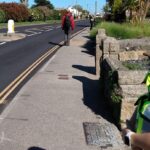An open letter to my bailiffs
To whom it may concern,
thank you for your letters requesting £1000. Thank you in particular for the recent letter regarding a “Distress Warrant”. It is a helpful reminder that I was ordered to pay these court costs by the 17th of December 2011 after being found guilty of Aggravated Trespass in Fortnum and Mason during a protest against their failure to pay tax they owed the exchequer. Also, thank you for visiting my parents in rural Perthshire to ascertain my current address in Oxford in order to more diligently pursue the sum I owe you. They were very impressed to see Tayside Police offiicers on their doorstep at 7:45am – in particular that they had made it the best part of a mile down the bumpy track to the house.
I hope you are reassured to hear that I am actively considering the possibility of paying you at some point in the future. However, I have a few questions pertaining to the repayment which will impact on the likelihood that I pay and on the timeliness with which I do so.
The first question relates to the possibility that you may at some point be obliged to pay the money back to me.
As you may be aware, I am, along with all of my co-defendants, appealing to the High Court against the ruling of District Judge Snow. Our case will be heard in February. I would remind you that another group of people at the same protest charged with an identical crime and with identical evidence against them were found not guilty by a different judge. For this reason, and many others, I believe that there is a reasonable chance that my conviction will be quashed by a High Court Judge.
If, at this point, I have already payed you the £1000, you will then presumably be obliged to return the money to me. My first question therefore is, can you be trusted not to lose my money?
My first experience with the attempts of British police to keep track of my possessions was in my first year at university. I was at Edinburgh, and it was the year that the new Scottish Parliament building was being opened. In what was, in retrospect, a surprisingly joyful action, various friends and I worked with some children on the council estate next to the Parliament to carefully paint a 10m long banner saying “HOPE”. We liked that banner – it was elegant and clear, and we foresaw many potential uses over the years. Those were heady days.
As the Parliament building was opened, my friends unveiled it down the cliff overlooking Holyrood whilst I directed them from below by phone. Two Lothians and Borders Police Officers immediately appeared confiscated the banner. “Health and Safety” they said. They told us we could collect our vast piece of art from the local station the next day. When we got there, they told us that they ‘couldn’t find’ our ten metre banner.
My second experience of the success of British police officers in caring for the possessions of others was after the Fortnum and Mason protest. All of the possessions I had on me were taken by the officers at Illford Police Station. This included a loud hailer, my Blackberry – which had on it all of the contact details I needed for work – three jumpers, a blue T-shirt on which I had lovingly hand painted the words “public spending: it pays for itself”, a pair of shoes, a pair of trousers, a jacket, a rucksack, and two socks.
When I left the station, I was told that my property would be kept for a short period in order to be examined by a police laboratory and then returned to me. After numerous conversations with our lawyers, in which it seemed to me that this position changed on a number of occasions, it became clear that ‘soon’ meant ‘after our trial’ – seven months after it was taken. We were given the number and the email address of the officer to contact in order to collect our possessions.
I rang and emailed him, and initially he replied to say that yes, we could make an arrangement to return my possessions. However, when I tried to make such an arrangement, he stopped replying to my emails. I rang him repeatedly.
After four months of regular phone calls and a few emails, I finally received a message to say that a different officer was now responsible for my property. When I contacted him, he was much more helpful and even got the the stage of agreeing a date on which my am friend, who lives in London, could collect the various items taken from me.
She enrolled another friend to help carry the numerous items, and they, excited, turned up at the police station that morning. Once there, they admitted to her that they had lost all of my property.
When I rang the following week, I was told that the Met had changed their mind. They had now located at least some of my stuff – including my phone. But they didn’t want to return my possessions to me until after my appeal – likely to be 18 months at least after they took it.
Perhaps one day, Britain’s legal authorities will learn to care for the property of others. It is a lesson we all have to learn growing up. But until that day, my second question is this: assuming the answer to the first question ought to be yes, why should I trust you again with my propoerty?
The third question is about one item, in particular: my telephone. As previously mentioned, my phone has in it many of the contacts I need for work. It is hard to quantify, financially, the value of these contacts over the period since my phone was taken. But I would estimate the cost to my employers – a small charity – to be at least £500. I wonder, would you be willing to commit to reimbursing my employers this sum? If you aren’t able to make such a commitment, I shall have to consider seriously whether I ought to prioritise paying £1000 to the small charity I work for before I come to paying these court costs, and so I couldn’t commit to making this payment now.
I await your prompt reply.
Yours sincerely,
Adam Ramsay




I truly tend to go along with the whole thing that was in fact
put into writing throughout “An open letter to my bailiffs
| Bright Green”. Many thanks for pretty much all the tips.
I appreciate it,Stacie
Adam You are a singular man fighting against the many injustices perpetrated by Local Councils and Officers in the name of the Law. Things have not changed over the last couple of centuries – take one example of a young girl found guilty of stealing a lace handkercheif in Haverfordwest about 120 years ago. Stripped to the waist and marched then sent to a penal colony for life. Keep up with the good work
Keep up the good work Adam!
They need(ed) your phone to investigate you and spy on your colleagues and friends. They would not return your phone because they wanted to stifle your performance. Their weariness of you can be perceived as a compliment!
Did they give you a receipt?Have you considered seeking compensation for the loss of your property? It is inexcusable to let them get away with “losing” it.
How awfull to see two police officers making their way to your house as a parent – they must have had a heart attack thinking the worse. How vile!!